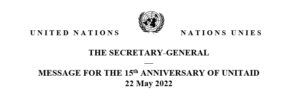UN Secretary-General commends Unitaid’s commitment to health equity and innovation in advance of 15th anniversary
Geneva – Unitaid will celebrate its anniversary on the eve of the World Health Assembly this 22 May at a high-level event that will bring together partners from governments, implementing agencies, civil society and affected communities. In recognition of Unitaid’s 15-year history and its leadership role in global health, United Nations Secretary-General António Guterres issued the following statement of support.

I am pleased to mark the 15th anniversary of Unitaid and its critical role in breaking down barriers in low- and middle-income countries to scale up innovative health services and products to ensure health for all and realize the 2030 Agenda for Sustainable Development.
Thanks to Unitaid, more people across Africa have access to the best HIV treatments at a fraction of the original price. Young children have been cured of tuberculosis with high-quality formulations that are easy to administer. Millions of young people are better protected against malaria through large-scale seasonal delivery of medicines, an approach that has dramatically reduced child mortality without raising costs.
The COVID-19 pandemic highlighted the need for equitable access to health commodities and strong, coordinated global health responses. Unitaid’s agile approach enables innovative solutions to prevent, diagnose and treat diseases, saves precious time and helps strengthen our collective capacity to respond to current and future health threats.
I commend Unitaid’s commitment to health equity and innovation in addressing global challenges. My warmest congratulations for your outstanding efforts in advancing global health and saving lives.
- See our special Unitaid at 15 webpage
